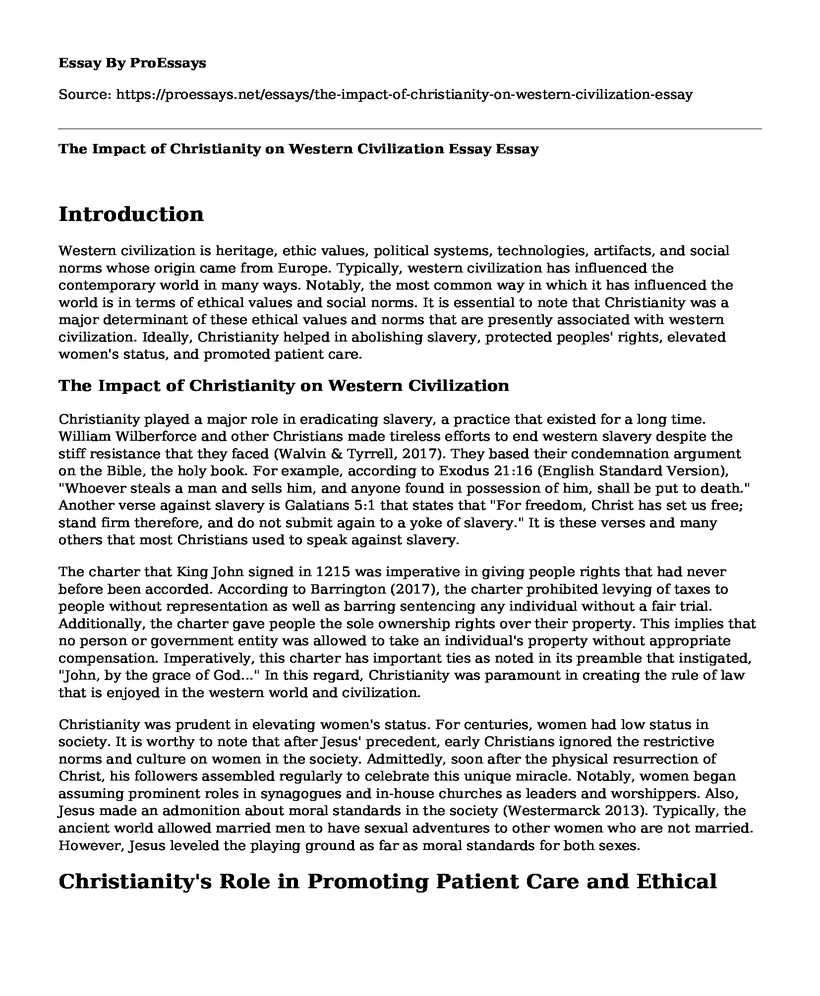Introduction
Western civilization is heritage, ethic values, political systems, technologies, artifacts, and social norms whose origin came from Europe. Typically, western civilization has influenced the contemporary world in many ways. Notably, the most common way in which it has influenced the world is in terms of ethical values and social norms. It is essential to note that Christianity was a major determinant of these ethical values and norms that are presently associated with western civilization. Ideally, Christianity helped in abolishing slavery, protected peoples' rights, elevated women's status, and promoted patient care.The Impact of Christianity on Western Civilization
Christianity played a major role in eradicating slavery, a practice that existed for a long time. William Wilberforce and other Christians made tireless efforts to end western slavery despite the stiff resistance that they faced (Walvin & Tyrrell, 2017). They based their condemnation argument on the Bible, the holy book. For example, according to Exodus 21:16 (English Standard Version), "Whoever steals a man and sells him, and anyone found in possession of him, shall be put to death." Another verse against slavery is Galatians 5:1 that states that "For freedom, Christ has set us free; stand firm therefore, and do not submit again to a yoke of slavery." It is these verses and many others that most Christians used to speak against slavery.
The charter that King John signed in 1215 was imperative in giving people rights that had never before been accorded. According to Barrington (2017), the charter prohibited levying of taxes to people without representation as well as barring sentencing any individual without a fair trial. Additionally, the charter gave people the sole ownership rights over their property. This implies that no person or government entity was allowed to take an individual's property without appropriate compensation. Imperatively, this charter has important ties as noted in its preamble that instigated, "John, by the grace of God..." In this regard, Christianity was paramount in creating the rule of law that is enjoyed in the western world and civilization.
Christianity was prudent in elevating women's status. For centuries, women had low status in society. It is worthy to note that after Jesus' precedent, early Christians ignored the restrictive norms and culture on women in the society. Admittedly, soon after the physical resurrection of Christ, his followers assembled regularly to celebrate this unique miracle. Notably, women began assuming prominent roles in synagogues and in-house churches as leaders and worshippers. Also, Jesus made an admonition about moral standards in the society (Westermarck 2013). Typically, the ancient world allowed married men to have sexual adventures to other women who are not married. However, Jesus leveled the playing ground as far as moral standards for both sexes.
Christianity's Role in Promoting Patient Care and Ethical Values in Western Civilization
Additionally, Christianity impacted western civilization by promoting the virtue of caring for the dying and sick members of the society (Fitzgerald, 2014). In ancient times, people would thrust aside individuals who began to experience terminal sickness. Furthermore, they could cast these patients out upon public places and leave them unburied. Nevertheless, when Christianity came to the world, the practice changed. Christians in the New Testament visited the sick, prayed for them, and encouraged them as they battled their sickness.Conclusion
In general, the impact of Christianity on western civilization cannot be understated. Christianity helped in establishing good ethical practices and norms that are part of the western civilization. These norms and ethical values include eradication of slavery, elevation of the status of women, caring for the sick, and human rights among others. These values and norms have become the principles guiding the contemporary society.
References
Barrington, R. (2017). The Magna Carta. Encyclopaedia Britannica.Fitzgerald, J. J. (2014). Can philosophy of religion be pastoral? The problem of evil and the ethics of comforting the sick. Journal of Spirituality in Mental Health, 16(4), 239-260.
Walvin, J., & Tyrrell, A. (2017). Whose history is it? Memorializing Britain's involvement in slavery. In Contested Sites (pp. 147-169). Routledge.Westermarck, E. A. (2013). Christianity and morals. Routledge.
Cite this page
The Impact of Christianity on Western Civilization Essay. (2022, Feb 21). Retrieved from https://proessays.net/essays/the-impact-of-christianity-on-western-civilization-essay
If you are the original author of this essay and no longer wish to have it published on the ProEssays website, please click below to request its removal:
- Media and Islamophobia Influence in the USA Essay
- Essay Sample on the Genre of Gospel in the New Testament
- Essay Example on Religion and Sport: Christianity's Influence on Modern Sports Culture
- Essay Example on Westboro Baptist Church Protests Military Funerals
- Essay Sample on Christians Struggling to Balance Secular and Godly Dynamics
- Status of Women in Hinduism - Essay Sample
- Crimes in the Bible - Free Essay Sample







